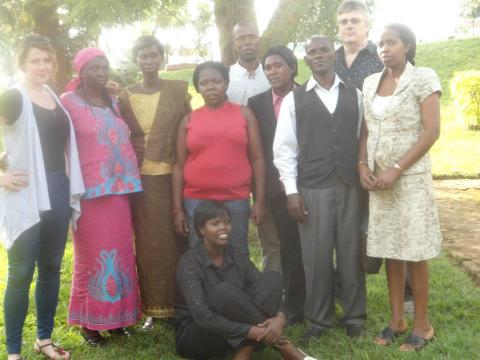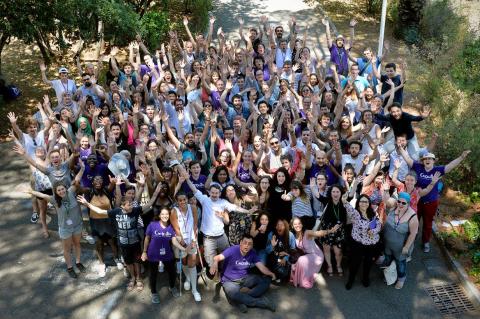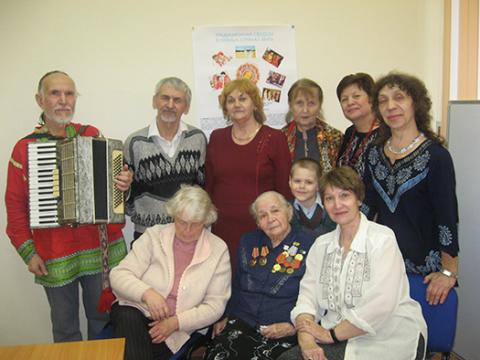These three URI Cooperation Circles bring people together and promote harmony using arts, music, and culture. Since these traditions are common across communities, enjoying them together forms a good starting place for intercultural discussion and appreciation. By reaching out across stereotype-built barriers to foster a deeper level of cultural sharing, these groups are helping their communities build stronger and more meaningful foundations for peace.
Réseau Culturel SANGWA, Rwanda
Réseau Culturel SANGWA is made up of Muslim, Christian, and Hutu/Tutsi women. Since Rwandan society is severely fragmented along ethnic lines, a legacy of the violent 1994 genocide, women and children face the brunt of the effects and consequent discrimination. The women of SANGWA design activities to teach youth to respect individuals from different communities, and to engage adults in dialogue across religious/ethnic lines. Their work has already helped members of the community achieve reconciliation and spread the message of tolerance to others.
The Cooperation Circle’s activities are divided into two domains: Culture & Arts, and Gender & Peace. Under the Culture and Arts domain, SANGWA Cultural Network promotes dialogue between parents and children, old and young, to build a culture of peace and wisdom, as sources for a harmonious life within families. This is done so that children grow up to respect people of diverse religious and cultural backgrounds.
“We see ourselves creating a generation of young people that is tolerant and that lives beyond the ethnic and cultural differences that had torn our communities in the past. We have also helped women to use their religious and cultural teachings to promote tolerance and reconciliation during our trainings so as to have strong cohesive communities.”
CLICK HERE TO READ THEIR FULL CC PROFILE
Coexister CC, Paris, France
Coexister CC is a youth-led organization that promotes religious equality with respect to each person’s belief. They inspire individuals and organizations not to engage in evangelism, discrimination, and proselytization. Their activities, Annual Festiv’All Together and InterFaith Tour, promote civil secularism and unite societies. At the rate of about one per week, the group organizes conferences and visits to places of worship with 11 groups throughout France. One large project involved organizing a 15,000-student festival in three cities where music, conferences, and blood donation drives took place.
“We use action. We want to go far beyond the simple dialogue or theology approach. We have realized that by doing things together, even non-religious activities (sports, music, travel, etc.) we manage to bring people together. Our CC helps communities become more open and liberal, and overcome stereotypes and prejudice so that everyone can live in harmony and enjoy diversity. Also, through our interfaith tour we promote these values on a global level, making significant positive changes in the world.”
CLICK HERE TO READ THEIR FULL CC PROFILE
Euro-Asia CC, Novosibirsk, Russia
Euro-Asia is making a proactive effort to share the richness of Siberian cultures and traditions with the rest of the world. They are building strong bridges within their community, and on larger scale, between Europe and Asia. Their events bring together Catholics, Baptists, Altai, and various Siberian traditions in an active effort to build bridges between different religions and traditions. Among a wide variety of events celebrating a mingling and appreciation of cultural traditions, Euro-Asia has organized symposia, round tables, and workshops around health and traditions. Some members work with pensioners, invalids, and children. The CC celebrates the spring equinox and other festivals together in locations like the one-of-a-kind Sun Museum in Novosibirsk. “We share the wisdom of the indigenous people of Siberia with interested partners. We also appreciate learning from people around the world.”
“We are bringing a lot of positive energy to our community. Also, we are spreading information about our rich Siberian cultures and traditions, beginning to build bridges not just in our community, but between Europe, Asia, and the rest of the world.”



